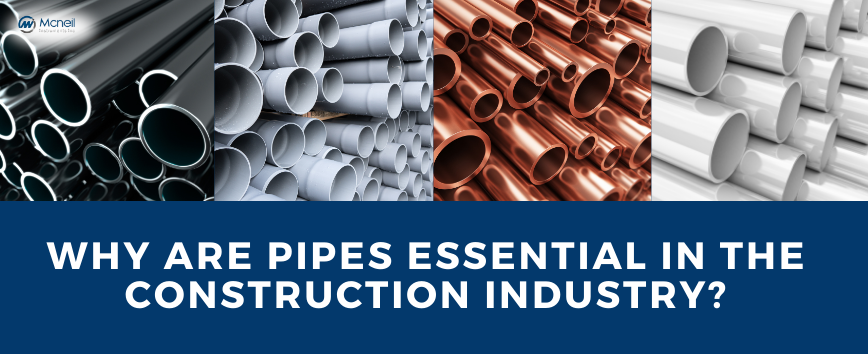Pipes are essential components in a wide range of applications, from delivering clean drinking water to transporting gases and chemicals in industrial processes. Their versatility and importance cannot be overstated, and they come in various materials, shapes, and sizes to suit different needs. In this blog, we will delve into the world of pipes, exploring their materials, uses, types, and the standards that ensure their quality.
What Are Pipes?
Pipes are long, hollow tubes designed to carry liquids, gases, or small solids from one location to another. They are integral to many systems, serving as the conduits for essential fluids and gases. Depending on the material they are made from, pipes can be used in a variety of environments and applications.
How Are Pipes Manufactured?
The manufacturing process of pipes varies depending on the material and the intended use. Generally, the process involves:
- Selection of Raw Material: High-quality materials like steel or copper are chosen based on the application.
- Shaping: The material is shaped into the desired form (round, square, or rectangular) using specialized equipment.
- Welding/Seaming: In the case of welded pipes, the edges are welded together to form a seam, while seamless pipes are made without any seams, offering higher pressure resistance.
- Finishing: The pipes are polished and treated to enhance their durability and corrosion resistance.
- Quality Control: Each pipe undergoes rigorous testing to ensure it meets the required standards.
Materials Used in Pipes
Pipes are made from a variety of materials, each chosen based on the specific requirements of the application. The most common materials include:
- Steel: Known for its strength and durability, steel pipes are often used in high-pressure environments and industrial applications.
- Copper: Copper pipes are commonly used in plumbing due to their corrosion resistance and ability to handle high temperatures.
- PVC (Plastic): PVC pipes are lightweight, easy to install, and resistant to corrosion, making them ideal for water supply and drainage systems.
Shapes and Sizes of Pipes
While most pipes are cylindrical, they come in various shapes and sizes to meet the diverse needs of different industries. At Mcneil Instrument, we manufacture and export stainless steel pipes in the following shapes:
- Round: The most common shape, used in everything from water supply to industrial processes.
- Square: Often used in structural applications where aesthetic and functional attributes are important.
- Rectangular: Typically used in construction and architectural applications for their strength and clean lines.
Uses of Pipes
Pipes serve critical functions in various sectors, including:
- Water Supply: Pipes are essential for delivering potable water to homes, businesses, and industries.
- Gas Supply: They are used to transport natural gas, which is crucial for heating and cooking.
- Sewage and Drainage: Pipes carry wastewater away from buildings to treatment plants, ensuring sanitation and public health.
- Industrial Processes: In factories, pipes move chemicals, oils, and other substances vital for manufacturing.
Types of Pipes Manufactured by Mcneil Instrument
At Mcneil Instrument, we specialize in manufacturing a wide range of pipes that meet the stringent requirements of various industries. Some of the types we produce include:
- KOC Approved Seamless Pipes
- Saudi Aramco Approved Pipes
- Takreer Approved Pipes
- ADNOC Approved Pipes
- BP Approved Pipes
- PDO Approved Pipes
- Technip Approved Pipes
- SABIC Approved Pipes
- Petro Rabigh Approved Pipes
- KNPC Approved Seamless Pipes
- Qatar Gas Approved Pipes
- Qatar Petroleum Seamless Pipes
These pipes are manufactured in compliance with ISO 9001:2015 and ASTM standards, ensuring the highest levels of quality and reliability.
Pipe Fittings
To create complete piping systems, pipes are joined together using various fittings:
- Elbows: Change the direction of the pipe.
- Tees: Join three pipes at a single point.
- Couplings: Connect two pipes of the same size.
- Reducers: Connect pipes of different sizes.
- Valves: Control the flow of fluids.
What Are the 5 Types of Pipes?
The five most common types of pipes include:
- Steel Pipes: Used for high-pressure applications and industrial use.
- Copper Pipes: Ideal for plumbing and heating systems.
- PVC Pipes: Commonly used in water supply and drainage systems.
- Stainless Steel Pipes: Known for their corrosion resistance and strength.
- Ductile Iron Pipes: Used in water and sewage systems for their durability.
Why Choose Mcneil Instruments for Your Pipe Needs?
At Mcneil Instruments, we are committed to delivering top-quality pipes that meet the diverse needs of our clients. Here’s why you should choose us:
- Quality Assurance: We adhere to strict quality standards like ISO 9001:2015 and ASTM, ensuring every pipe meets the highest industry requirements.
- Wide Range of Products: We offer a comprehensive range of pipes in various materials, shapes, and sizes.
- Custom Solutions: We work closely with our clients to develop customized solutions tailored to their specific needs.
- Global Reach: We export our products to over 20 countries worldwide, including the Middle East, Europe, Asia, North America, South America, Africa, and Oceania.
Conclusion
Pipes are more than just simple conduits; they are critical components in a wide range of industries, ensuring the safe and efficient transport of fluids and gases. Whether you need pipes for water supply, gas distribution, or industrial processes, Mcneil Instruments offers high-quality, reliable solutions that meet the highest standards of performance and durability.
For all your pipe needs, trust Mcneil Instruments to deliver the best products and services, tailored to your specific requirements.






